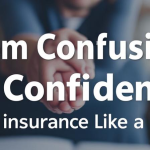Starting a new business is a thrilling and often overwhelming experience. As an entrepreneur, your mind is likely filled with ideas about product development, market strategies, and customer acquisition. But amidst all this excitement, there’s one critical aspect that can be easily overlooked — protecting your business with the right insurance.
Business insurance is not just a legal requirement in many cases; it’s a crucial safety net that can protect your startup from unexpected events that could otherwise jeopardize your financial stability. From lawsuits and property damage to employee injuries and cyberattacks, the right insurance coverage can be the difference between keeping your business afloat or facing ruin.
However, navigating the world of business insurance can be complex, especially when you’re just starting out. Different types of policies cover different risks, and the variety of options available can leave you feeling uncertain about what you need. In this article, we’ll guide you through the process of choosing the right business insurance for your new venture, offering practical advice on how to assess your risks, select appropriate coverage, and ensure your startup is properly protected.
Why Is Business Insurance Important for Startups?
The importance of business insurance cannot be overstated. When you launch a startup, you expose yourself to a variety of risks. Without the right insurance, these risks can result in substantial financial losses. Whether it’s damage to your property, a lawsuit from a customer, an employee injury, or a data breach, these events can cause serious setbacks for your business.
Business insurance provides a safety net that helps mitigate the financial burden of such events. It can cover the cost of legal fees, medical expenses, property damage, lost income, and more. In short, it ensures that your business can continue to operate, even after a disaster strikes.
For example, imagine your office suffers damage due to a natural disaster, and your operations are temporarily halted. Business interruption insurance can help you cover lost income while you rebuild. If an employee is injured on the job, workers’ compensation insurance will help cover their medical expenses, reducing your liability.
How to Determine the Right Business Insurance for Your Startup
When it comes to choosing the right insurance for your business, one size does not fit all. Each startup has its own unique set of risks, and it’s essential to tailor your insurance coverage to your specific needs. Here’s how you can go about selecting the right policies:
1. Identify Your Risks
The first step in choosing the right insurance for your startup is to assess the risks your business faces. Different types of businesses face different kinds of risks. For example, a construction company faces significant risks related to property damage, employee injuries, and legal claims, while a tech startup might be more concerned about data breaches, intellectual property theft, and software errors.
Ask yourself: What could go wrong with my business? What types of accidents, damages, or claims could lead to financial loss or shutdown? Consider factors such as:
- The type of products or services you offer
- Whether you have a physical location or operate online
- The number of employees you have
- Whether you store sensitive customer information or intellectual property
By understanding the specific risks your business faces, you can better determine the types of insurance you need.
2. Understand the Types of Business Insurance
There are several types of business insurance policies available, each designed to cover specific risks. Here’s an overview of the most common types of coverage that new businesses should consider:
- General Liability Insurance: This is one of the most fundamental types of business insurance. It covers third-party claims for bodily injury, property damage, and personal or advertising injury. For instance, if a customer is injured at your business location or if you cause damage to a client’s property, general liability insurance will cover legal costs and medical expenses.
- Property Insurance: If you own or lease a physical space, property insurance covers damage to your building, inventory, equipment, and other physical assets due to fire, theft, or vandalism. Even if your business is home-based, property insurance can protect your business equipment and inventory.
- Workers’ Compensation Insurance: If you have employees, workers’ compensation insurance is often legally required. It covers medical expenses, rehabilitation, and lost wages if an employee is injured or becomes ill on the job. This type of insurance protects both your employees and your business from costly legal claims related to workplace injuries.
- Professional Liability Insurance (Errors & Omissions Insurance): If your business provides professional services, advice, or expertise, professional liability insurance protects you from claims of negligence, errors, or omissions. For example, if a client claims that your advice led to financial loss, this policy will help cover legal fees and potential damages.
- Commercial Auto Insurance: If your business uses vehicles for deliveries, employee transportation, or other operations, commercial auto insurance is necessary. It covers damage to company-owned vehicles as well as liability in case of an accident. Personal auto insurance typically won’t cover business-related incidents, so commercial auto insurance is essential for businesses that rely on transportation.
- Cyber Liability Insurance: In today’s digital world, data breaches and cyberattacks are growing threats. Cyber liability insurance protects your business from financial losses caused by data breaches, hacking, and other cyber incidents. If your business collects sensitive customer data or relies on digital systems, cyber liability insurance is increasingly important.
- Business Interruption Insurance: If a covered event, such as a fire or natural disaster, forces your business to temporarily close, business interruption insurance helps cover lost income and ongoing expenses like rent and utilities. This type of insurance is essential for businesses that rely on a physical location or have a steady stream of customers.
3. Check for Legal Requirements
Depending on your location and the nature of your business, certain types of insurance may be legally required. For example, most states require workers’ compensation insurance for businesses with employees. Some jurisdictions may also require commercial auto insurance if your business uses vehicles for work purposes.
Make sure to check your local regulations to ensure you comply with all legal insurance requirements for your industry. Failure to carry the necessary coverage can result in hefty fines or legal penalties, and it could even put your business at risk of lawsuits.
4. Consider Your Business Size and Growth Plans
Your startup’s size and future growth plans should also factor into your insurance decisions. If your business is small and just starting, you may not need the same level of coverage as a larger company with more assets and employees. However, as your business grows, your insurance needs may evolve.
For instance, you may need to upgrade your property insurance to cover additional assets or purchase more liability coverage as you take on more clients or hire more employees. Be sure to periodically review your insurance coverage as your business expands to ensure you remain adequately protected.
5. Get Expert Advice
Business insurance can be complex, and it’s easy to get overwhelmed by the numerous options available. To ensure you’re choosing the right policies, consider working with an insurance broker or agent who specializes in business insurance. They can help you assess your risks, explain different coverage options, and recommend the best policies for your specific needs.
An expert can also help you navigate the fine print of insurance policies, ensuring that you fully understand the terms and conditions of your coverage. This can prevent costly mistakes down the line and give you peace of mind knowing you have the right protections in place.
The Cost of Business Insurance
While it’s tempting to go for the cheapest insurance option, remember that the cost of your policy should reflect the level of coverage your business needs. Premiums will vary depending on factors such as the type of business, its location, the amount of coverage required, and the number of employees.
Though business insurance can be a significant expense, it’s a necessary investment in the long-term survival and success of your startup. Consider the potential costs of a lawsuit, property damage, or employee injury—having the right insurance coverage could save your business from financial ruin..
Conclusion
Choosing the right business insurance for your startup is one of the most important decisions you’ll make as an entrepreneur. By assessing your business risks, understanding the different types of coverage, and consulting with an insurance expert, you can ensure your business is protected from the unforeseen events that can occur in today’s unpredictable world.
While it may seem like an overwhelming task, investing time and resources into securing the right insurance will pay off in the long run, giving you peace of mind and allowing you to focus on growing your business with confidence. After all, the goal of entrepreneurship is not just to succeed, but to build a sustainable business that can weather the storms of uncertainty—insurance is your first line of defense in achieving that goal.






Leave a Reply